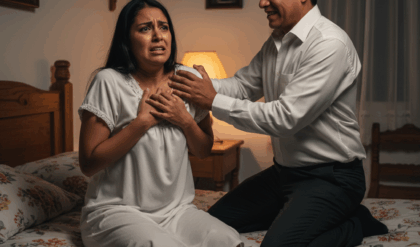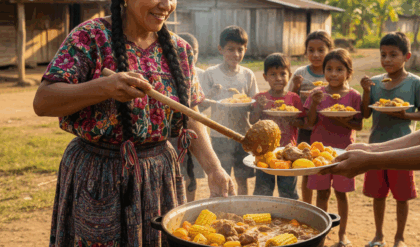Doña Elena lives alone on her minimal pension. Even so, every evening she cooks a large pot and distributes dishes to the children playing in the street. “I don’t have much, but sharing makes me feel alive,” she says.
Every evening, as the sun begins to set over the neighborhood, I hear the clink of spoons against pewter plates. It’s Doña Elena, my second-floor neighbor, coming out with her loaded tray.
“Children! Let’s eat!” she shouts from the balcony, and we all run, leaving the ball in the middle of the street.
I was the first to receive her food. I was seven years old, and my mother worked late cleaning houses. Doña Elena saw me sitting on the curb, my stomach rumbling, and came down with a deep bowl of stew.
“Here, son. It’s still warm.”
“Thank you, doña,” I said, with the embarrassment of someone who can’t return a favor.
She sat next to me on the step and stroked my head.
“Don’t thank me. I like to cook, but it’s no fun to cook alone. When I share, it’s as if everyone were eating at my table.”
The years passed, and Doña Elena continued with her ritual. Her pension barely covered the basics, we all knew that. We had seen her at the market haggling over each tomato, buying the bones with meat for the broth, choosing vegetables that were already a little overcooked because they cost less.
One day I dared to ask her:
“Doña Elena, why do you continue to cook for us if you yourself have so little?”
She was silent for a moment, stirring her giant pot. Then she looked at me with those clear eyes that seemed to pierce right through you.
“Look, my son,” she said, “when my husband died and my children went to the capital, I thought I was going to dry up inside. The house felt like a cemetery.” But then I saw you playing down there, and I remembered when my children used to run around like that. And I started cooking.
She wiped a tear with the back of her hand, still stirring.
“I don’t have much, it’s true. Sometimes I have to stretch the rice with more water, or the stew with more potatoes. But when I go down and see your little faces, when you say “how delicious, ma’am,” when you fight over who gets to scrape the pot… that’s priceless. Sharing makes me feel alive. It reminds me that I’m still useful, that I’m still needed.”
I’m twenty-two now and a university student, but I still live in the neighborhood. And every afternoon, when I come back from classes, I stop by Doña Elena’s apartment. Sometimes I take her a kilo of rice or some vegetables from the market.
“You didn’t have to bother, my son,” she always tells me.
“It’s no bother, ma’am. It’s for the big pot.”
She smiles and kisses me on the forehead, as if I were still that hungry seven-year-old.
Because that’s what I learned from Doña Elena: that poverty isn’t about what you have, but about what you can’t give. And she, with her minimal pension and her battered pot, gave us the greatest thing: she taught us that sharing is the most beautiful way to stay alive.
The years kept moving forward, and so did we, the children who had once fought over who got to scrape Doña Elena’s battered pot. Some of us found work at factories, others left for the city in search of a better future. I stayed for my studies, and in all that time the pot never stopped bubbling on Elena’s stove.
But one evening, when the sun had already slipped behind the rooftops, there was no clinking of spoons, no call from the balcony. The ball rolled down the street, and the children paused, confused.
“Where’s Doña Elena?” one of them asked.
I rushed upstairs. The door to her apartment was ajar, and inside I found her sitting quietly at the table, the pot still empty on the stove. She looked tired, smaller somehow, as if the years had finally caught up with her.
“Ma’am, aren’t you going to cook today?” I asked, my voice trembling.
She smiled weakly. “The doctor told me yesterday… my heart is weaker than I thought. They told me I should rest, not strain myself with heavy pots.”
I sat down across from her. The silence pressed in, heavy.
“But what about the kids?” I whispered.
She placed her thin hand over mine. “My son, it’s time for you to cook for them. All of you grew up eating from this pot. Now it’s your turn to keep it alive.”
That night, I went to the market. I bought rice, vegetables, and some chicken wings. I wasn’t sure how to stretch them the way she did, but I tried. When the children gathered, expecting Elena’s call, I stood in the street and shouted nervously:
“Kids! Let’s eat!”
They laughed, surprised, but they came running. And when I served them bowls of steaming rice with stew, their faces lit up just like ours did years ago.
From the window, Doña Elena watched, tears glistening in her eyes.
Now it has become our turn, we – her “street children” – who once received from her battered pot, now carry it on. Each week, one of us buys what we can and cooks in her kitchen. Elena sits in her chair, giving advice:
“Add more garlic, hijo, it gives flavor.”
“More water, hija, so everyone has enough.”
And when the children finish, scraping the bottom with their spoons, she smiles again, stronger than before.
Because the pot never really belonged to Doña Elena alone. It was always the heart of the neighborhood, and now it beats in all of us.
That’s what she left us: not food, but the duty – and the joy – of keeping each other alive
News
Despite the objections of my children and grandchildren, I took a concubine at the age of 90, thinking I got the right person. Who would have thought that exactly 3 months after the wedding, I would have to call my children and grandchildren home immediately when my wife tricked me./hi
At 90, I Defied My Family to Marry a Younger Bride. I Thought I’d Found Love… But Just Three Months Later, I Was Forced to Call My Children in Shame At the age of 90, with silver hair and wrinkled…
My husband’s strange smile on our wedding night sent shivers down my spine. It turns out he had been keeping a terrible secret for so many years…/hi
The Strange Smile on My Wedding Night Made My Blood Run Cold – He Had Been Hiding a Terrible Secret for Years… When I nodded my head and agreed to the wedding, there wasn’t a trace of the excitement people…
A Simple Woman Was Banned from Her Cousin’s Wedding—Until Her Billionaire Husband Bought the Venue/hi
I never expected to be uninvited from my own cousin’s wedding. The reason I wasn’t glamorous enough for her Instagram perfect day, but when my husband decided to buy the entire wedding venue in response, well, that’s when things got…
Mother-in-law pulled her hair, brother-in-law kicked her – and this is what her billionaire husband did../hi
I was on my knees, my mother-in-law’s fingers twisted in my hair, my brother-in-law’s boot connecting with my ribs. They called me worthless, a burden. But when my husband walked through that door, what happened next made them all wish…
At her Friend’s Birthday, They Seated her Outside and Mocked Her —Then her Billionaire Husband…./hi
No, please stop. Please get her out of here. Oh my god, this is incredible. They dragged me through the mud while everyone laughed. My friend ordered guards to throw me out of the party like garbage. I was crying,…
Taking his wife to the emergency room, the doctor turned pale and called me into the room to reveal: Look at this and call the police immediately./hi
Taking my wife to the emergency room, the pale-faced doctor called me into the room and revealed: Look at this and call the police immediately That night, it was raining heavily in the suburbs of Seattle. I was sitting in…
End of content
No more pages to load











